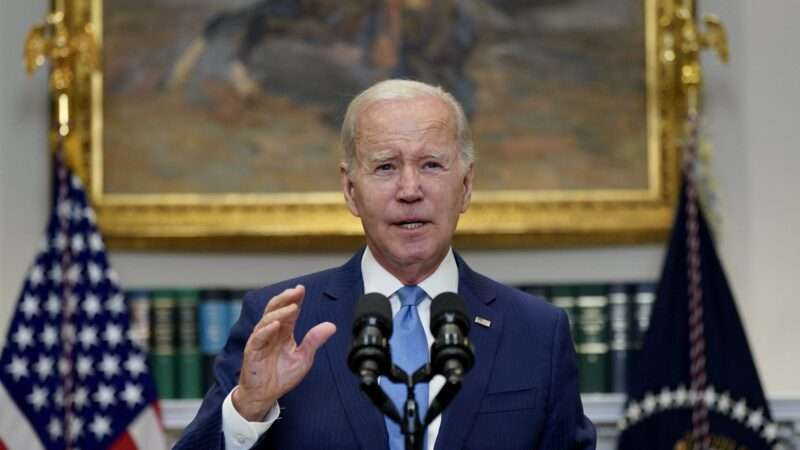
In a recent interview with MSNBC's Stephanie Ruhle, President Biden responded to a question regarding his age (80 years old) and how that might affect his performance should he have a second term in office. "I have acquired a hell of a lot of wisdom and know more than the vast majority of people," Biden said, "And I'm more experienced than anybody that's ever run for the office."
This was a positive response to a tough question, but one that deserves more examination. No presidency, especially one so active with industrial policy and economic planning, can get by on this answer.
We all recognize that a person who's lived 80 years will have had more life experiences than one who has trod the planet for 70, 60 or 50 years. And it's easy to see that Mr. Biden, who has devoted his entire adult life to politics, is armed with countless stories and lessons learned about the nation's political economy. But granting this does not support the idea that Biden knows more than the vast majority of us, all topics considered. Nor does any of this matter much if his administration consistently fails to account for the vast majority of the people's knowledge taken together.
As one who will turn 90 in a few months, I'm more inclined to think that life's experiences make us realize how little we really know about the way the world works. Yes, we may excel at Trivial Pursuit over time, but I sympathize more with the character Ernest in J. M. Barrie's comic play The Admirable Crichton. When asked to explain why he's unaware of some important events, Ernest responds: "I am not young enough to know everything." Anyone calling on a great grandson to help set up a new smartphone can relate.
Biden's comment raises fundamental questions about what type of knowledge we need from a president. Writing in the 1940s, Friedrich Hayek penned what became a classic article: "The Use of Knowledge in Society." Hayek, who later received the Nobel Prize in economics, explained that human communities face a severe knowledge problem; knowledge is dispersed across countless individuals, each of whom knows more about his particular circumstances than can anyone else.
The point is simple, but profound: Neither Biden nor any other person has sufficient knowledge of material extraction, refining, manufacturing, transport, and on and on, to make an automobile tire, ballpoint pen, or even a paperclip from scratch. I emphasize "from scratch," a point made famous by Leonard Read in his 1958 essay, "I, Pencil." Anyone creating even so simple a product must find ways to tap into humanity's collective knowledge. Cooperation, interaction, and trade across a vast number of people is required. Not even a presidential administration can duplicate the efforts of so many involved players, or even know who every player is.
For an administration so invested in influencing resource use so that the right stuff gets produced in the right amount for the right folks—whether it's microchips, metals, energy, vehicles, or any of the things legislatively deemed as "infrastructure"—it's fruitless to simply assemble the brightest and best, find a consensus, and mandate a solution be applied to all economic agents. Hayek famously termed this belief a "fatal conceit." Instead, he suggested the refreshingly simple idea that broad goals and institutional guardrails be set. How to accomplish those goals is best left to the creativity of the people closest to the situation.
The Biden administration's recently announced air quality regulations for electricity generators provide a convenient example. Briefly stated, the EPA has proposed a 90 percent reduction in carbon emissions from power plants in the next few decades. But instead of just setting a clear benchmark—even a difficult one—and enforcing the standard, the Biden rule imposes what the EPA terms a "technology-based" standard, or a specific fix to be applied by fossil-fuel burning plants nationwide.
The more the administration uses a command-and-control approach to dictate how firms go about achieving reductions, the more it relies on its own knowledge rather than the collective ingenuity of the "vast majority" of people. It assumes Biden officials know more than anyone else about solving this problem, not only now, but in the future.
Wouldn't the administration see more success defining property rights to limited amounts of carbon emissions and allowing markets to set a price on emissions, as was done years ago for sulfur dioxide control? As these rights are bought, sold and traded, a market determines who gets to discharge emissions and how much. "Users" of air quality could consider endless opportunities—now and in the future—to reduce emissions, since doing so would pay. This approach even allows environmental interests to buy emission rights and retire them.
Biden, like so many before him, chose to rely on his own team's knowledge. Researchers at the Mercatus Center's RegData unit have found that the United States leads the industrial world in imposing command-and-control regulation instead of allowing markets to achieve desired outcomes. As of the end of 2021 (the last year analyzed), the United States had 1,094,447 regulatory restrictions in the Code of Federal Regulation. By comparison, in 2021, Australia had 238,528 federal regulatory restrictions on the books, and Canada had only 89,569.
Whatever one thinks of Mr. Biden and his faculties, we all have a knowledge problem, to some extent, of our own making. Instead of demanding clear goals and functioning markets to get us there, we millions of creative Americans question whose knowledge is greatest and allow the so-called best and brightest to attempt the whole job themselves. This, too, is a fatal conceit.
The post Biden's Experience Doesn't Mean He Can Plan an Economy appeared first on Reason.com.







